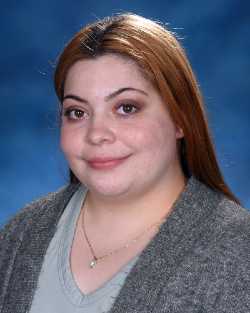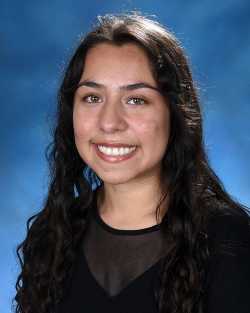Scholars
Cohort 7
Belen Avelar
 I graduated with highest honors from Prince George’s Community College with my A.A. in General Studies. I then graduated summa cum laude from the University of Maryland, College Park with my B.S. in Kinesiology. At UMD, I participated in the First-Year Innovation & Research Experience (FIRE), where I studied how stress impacts our health and our relationships. Under the guidance of Dr. Sarah Racz, I studied the role of hostile behavior between parents and adolescents during structured conflict resolution tasks. I worked on developing a coding scheme for measuring and characterizing nonverbal hostile behavior in adult participants, in addition to administering behavioral, physiological, and observational assessments to research participants.
I graduated with highest honors from Prince George’s Community College with my A.A. in General Studies. I then graduated summa cum laude from the University of Maryland, College Park with my B.S. in Kinesiology. At UMD, I participated in the First-Year Innovation & Research Experience (FIRE), where I studied how stress impacts our health and our relationships. Under the guidance of Dr. Sarah Racz, I studied the role of hostile behavior between parents and adolescents during structured conflict resolution tasks. I worked on developing a coding scheme for measuring and characterizing nonverbal hostile behavior in adult participants, in addition to administering behavioral, physiological, and observational assessments to research participants.
During my first year in STAR-PREP, I worked in Dr. Magali Fontaine’s lab to understand the interaction between red blood cells and mesenchymal stromal cells (MSCs). I used techniques such as flow cytometry to determine how red blood cells alter the morphology, surface marker expression, and immunosuppressive function of MSCs. Now as a second-year student in STAR-PREP, I am working in Dr. Tonya Webb’s lab to understand the role of YAP1 protein in CD1d-mediated antigen presentation to type I natural killer t cells in order to develop better cancer treatments.
Cinthia Flores
 I graduated from the University of Maryland, College Park with my bachelor’s in biology. During my undergraduate, I became interested in the cancer field and conducted research to further understand cancer and the interaction of the immune system.
I graduated from the University of Maryland, College Park with my bachelor’s in biology. During my undergraduate, I became interested in the cancer field and conducted research to further understand cancer and the interaction of the immune system.
I interned at the Institute for Bioscience and Biotechnology Research in Dr. Alexander Andrianov’s lab which designs novel adjuvants and delivery systems. My research was focused on analyzing complex stability between polyphosphazene and antigen through different ionic strengths and molecular weights. This was done to improve immunoadjuvants for the development of vaccine formulations in diseases such as cancer.
After graduating with my bachelor’s degree, I was accepted into STAR-PREP to enhance my scientific skills through experimental techniques, analytical, and communication development.
I chose to join the lab of Dr. Nevil Singh which focuses on studying cellular immune responses to various targets such as, pathogens, tumors, and self-antigens. Currently, my research is focused on analyzing if tumor preference for specific tissues is due to immune response differences. To do this, I am comparing various tumors growing in different tissues within immune-deficient vs immune-intact mice. This experience has grown my interests in the cancer biology and immunology field including cancer initiation and progression, tumor immunology and the microenvironment, as well as developing treatments such as immunotherapies.
My prior personal and research experiences have helped shape my future career goal to become a scientist in the cancer biology/immunology field to improve the health for individuals, particularly underrepresented groups. My goal is to pursue a PhD to address questions in the field on how to improve the prevention, detection, and treatment of diseases, particularly cancer.
Geralin Virata
From 2019 to 2022, I attended the University of California, Davis, where I earned my B.S. in Neurobiology, Physiology and Behavior. During my time at UC Davis, I conducted research in Dr. Rebecca Calisi’s Birds, Brains, and Banter Laboratory, where we investigated how animal brains facilitate and inhibit reproduction and parental care under stress conditions using Columba livia. My project, specifically, focused on how stress induced by a single-parenting lifestyle affected the brain, physiology and behavior of parents and chicks.
As a STAR-PREP scholar at UMB, I am excited to be continuing neuroscience research related to stress, but this time using a mouse model. Here, I am working in the Lobo Lab under the guidance of Dr. Mary Kay Lobo to investigate circuits involved in mood disorders, such as depression, and how stress alters these circuits, resulting in stress-induced behaviors. My project focuses on how the circuit involving basolateral amydala neurons projecting to the ventral pallidum is affected from chronic social stress and how alterations to this circuit promote social avoidance.
Following my post-baccalaureate experience, I will be entering a PhD program to gain the research training needed for me to pursue my career goal of becoming a principal investigator within the field of neuroscience and aiding future scientists-in-the-making to explore their own scientific curiosities.
Ijeoma Chikezie
Currently, I am a NIH postbaccalaureate scholar at the University of Maryland School of Medicine (STAR-PREP) where I have enhanced my time management skills by balancing graduate courses with full-time, independent research. Prior to my matriculation into STAR-PREP, I lost a friend to glioblastoma six months after her diagnosis and the news of her passing sparked my interest in studying the bidirectional interactions between the nervous system and cancer for my doctoral degree. My research under Dr. Antonino Passaniti focuses on the pathology behind breast cancer metastasis through its upregulation of oncogenic transcription factor, RUNX2. I will be investigating drug sensitivity and transcriptional activity of physiologically “normal” breast epithelial and oncogenic-expressing tumorigenic cells against a RUNX2: DNA-targeted computer aided drug-design (CADD522) in 3D culture, hoping to improve chemotherapy sensitivity against triple negative breast cancer. Through STAR-PREP, I have presented my research proposal at scientific meetings and developed my critical thinking through discussing higher level journal articles and graduate examinations. Connecting my previous research with my work in the Passaniti lab, I became interested in uncovering pathways behind brain metastasis and malignant CNS tumor formation.
Isaiah Williamson
I earned my Bachelor of Science in Psychology at Mount St. Mary’s University in 2022. I had the opportunity to work under the guidance of Dr. Slezak, where I examined the role of impulsivity in decision-making utilizing a delay discounting task in rodents. During this time, I helped to design experiments and program the operant conditioning boxes required for them, testing the impact of different schedules of reinforcement on impulsivity, as measured by delay discounting. Following this, I joined Dr. Kallarackal’s lab, and trained in methods to examine learning and memory in Caenorhabditis elegans (C. Elegans). Namely, I examined the impact of optogenetic stimulation of RIM interneurons in C. elegans during a salt aversion task.
As a STAR-PREP scholar, I chose to work in Dr. Mary Kay Lobo’s lab to characterize cell type-specific effects of drug use in the Nucleus Accumbens. I use techniques and methods such as retrograde and anterograde cre recombinase labeling, Ribotag, intravenous self-administration, and many more to examine process. Following STAR-PREP, I plan to pursue a PhD in Neuroscience, and stay within the realm of molecular neuroscience.
Krystal Florez Felix
In 2020, I received my bachelor’s degree in Biology from Universidad Ana G. Méndez in Puerto Rico. Seeking experience in the neuroscience field I started working as a research assistant at University of Maryland Baltimore in the laboratory of Dr. Asaf Keller. Here, I had the opportunity of working in various research project with different goals, nevertheless, my favorite one is the opioid exposure project. Our objective was to measure the endogenous opioid peptides, methionine enkephalin and beta endorphin on the brain after in utero opioid exposure in mice using radioimmunoassay and ELISA techniques. This project is important to the field because it attempts to close the gap in knowledge on the mechanisms inside the brain that enables long lasting disorders after exposure to opioids during developmental stages of a baby. Since this was my first independent project, I learn more about addiction and the importance of finding ways to ameliorate the effects of opioid exposure, moreover, I learned how to navigate a project with minimal supervision.
As a STAR-PREP scholar, I keep doing research with Dr. Keller, this time I research the effect of perinatal opioid exposure in the mammalian target of rapamycin (mTOR) pathway. Due to the multiple involvement of mTOR in many cellular processes this pathway might contribute to morphology and long-lasting modulation in the brain after drug exposure. To study mTOR, I use Western blots and histology of brain slices that target downstream effectors of mTOR. After STAR-PREP, I plan to pursue a Ph.D. in Addiction and behavioral neuroscience to better understand how drug consumption alters the brain for an improved treatment of addiction.
Muhammed Mizra
Hello, my name is Muhammed Zubair Mirza, I recently graduated with high honors from Seton Hall University in December of 2021 with a B.S. in Biology and minors in Middle eastern studies, and Chemistry. During my undergraduate time, I participated in a few research opportunities covering an array of topics exposing me to both the breadth and depth of biomedical research. My first significant research experience started in the lab of Dr. Roy Debasmita. The experiment centered on the effects of alcohol on germline development of Caenorhabditis Elegans. Additionally, during the summer of 2021 I participated in the Summer Undergraduate Internship Program (SUIP) at University of Pennsylvania Perelman School of Medicine where I was conducting research in the Lab of Dr. Marisa Bartolomei. I was particularly investigating DEHP, a common plasticizer, and how its influence during pregnancy can lead to biological alterations later in life. Through the STAR-PREP program I am currently participating in the lab of Dr. Margaret McCarthy where my research focuses on neurodevelopment and the exogenous exposure to THC. Here I am investigating the mechanisms of sex differences in the brain and the effects of THC on these mechanisms. I am thrilled to be a part of this lab and hope to make the most of it by learning valuable laboratory techniques and building a library of knowledge that could guide my future. Overall, my time in these labs solidified my interest in pursuing a MD/Ph.D. with my interests lying in development and exogenous influences on the body. The long-term goal is to hopefully acquire a better understanding of how our experiences can influence our biology, giving me the opportunity to provide a deeper understanding of treatment options to the medical community.
Bryan Bahoua
In 2019, I graduated with a B.S in Molecular Biology from Towson University. During my time at Towson University, I worked with Dr. Ana Maria Soto to characterize a proposed riboswitch in M.tuberculosis. Our goal was to understand how the stability and ligand binding properties of this riboswitch. We compared this riboswitch to an already characterized riboswitch found in B.subtilis.
After receiving my Bachelors, I worked in clinical regulation for a couple of years. I realized that pursuing a doctoral degree aligned more with my interests and traits. I joined the STAR-PREP program where I work with Dr. Tonya Webb to understand how artificial antigen presenting cells can affect modulation of NKT cells in patients. I am learning techniques such as ELISA, cell culturing and making nanoparticles to see if our aAPCs can increase NKT cell activation. After STAR-PREP, I plan to pursue a PhD in immunology or cancer biology to find new cancer immunotherapies
